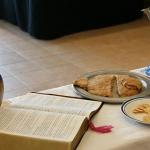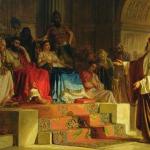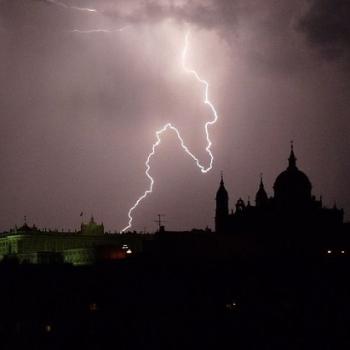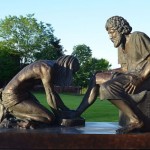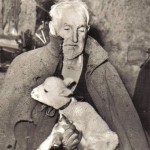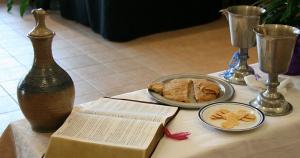 Acts 28:1-15
Acts 28:1-15
“When Paul saw them, he thanked God and took courage” (Acts 28:15).
This little verse humbles me. It makes me think. It makes me feel.
Here’s Paul, the greatest apostle in the world. He’s endured prisons in many cities, stripes above measure, the forty minus one stripes from the Jews five times, three times being beaten with rods, one stoning, three shipwrecks, a night and a day in the deep, thousands of miles of difficult travel, weariness, sleeplessness, hunger and thirst, coldness and nakedness, and perils from robbers, from his own countrymen, from the Gentiles, in the city, in the wilderness, in the sea, among false brethren.
He seems impervious to pain, indefatigable, and full of courage.
This is the impression we get of Paul, and yet he was human like we are. He did feel pain, he did get tired, and he did get discouraged. We just don’t see it very often. It’s almost as if he’s the father and we’re the children. My kids have no idea how hurt, tired, and cowardly I really am. As their father, I do allow them to see these sides of me, but I mostly show them how I can be hurt, tired, and cowardly and yet through the power of the Holy Spirit be able to do that which my Lord has commanded me to do.
And so I like Acts 28:15 because I find it’s one of many scriptural speed bumps that makes me slow down and take notice of something I might otherwise have missed.
We’re so used to reading stories of rugged individuals and Lone Rangers and stoic heroes that we forget that in the Body of Christ we are never alone and cannot do that which God calls us to by ourselves.
Again, here’s Paul, a spiritual superhero in my eyes, someone I’ve been reading about and thinking about in slow motion now for most of two months. He seems larger than life, and yet when he sees the brothers in Christ from Rome, he does two amazing things: he gives thanks to God, and he takes courage.
It might seem like a small thing that Paul thanked God, but actually to give thanks is the biggest thing of all. They say that good things come in small packages, which I often find to be true. It reminds me of the one in The Lord of the Rings who was chosen to carry the One ring. It wasn’t a dwarf of even an elf. It wasn’t the returning King Aragorn, and it wasn’t even the wizard Gandalf. Instead, it was the unlikely hobbit Frodo.
And so it is that giving thanks to God seems like such a small thing but is one of the biggest things of all. It’s with good reason that the early Christians called the Lord’s Supper in which Jesus fed them with the spiritual food which was Himself, the Eucharist, the “thanksgiving.” In giving thanks, we acknowledge that something good we have received was not obtained by ourselves and was not something we were owed.
When is it that we thank people? When they give us gifts we don’t deserve. We don’t normally thank our bosses for paying us: we’ve earned what we’re paid. We give thanks, sometimes as a formality, when we receive the obligatory Christmas or birthday gifts. But the best kind of giving thanks that I’ve found is the spontaneous, joyful, heartfelt thanks that comes from someone who recognizes me as a person. Mostly, of course, it’s my wife, Jackie.
To give thanks to God is to acknowledge Him to be God and the giver of every good gift. Paul could have been simply relieved when he found companionship, but instead he gives thanks. He knows that it is his Lord who has sent these faithful brothers in the Lord, the same Lord who once knocked him down and who had spoken to him in visions. It was Jesus, whom he once persecuted, who had sent these Christians. More than that, it was Jesus Himself who had come, because where the Body of Christ is, there is Jesus Christ.
So I love this moving little scene. At first glance, I’m drawn to the series of miracles earlier in the chapter, where Paul shakes off the deadly viper and then heals Publius’ father of a fever and dysentery. This doing miracles of could have given Paul courage and I’m sure they did. But it was the brethren, the fellow Christians, who truly encouraged Him. His miracles were done by the power of the Holy Spirit. But his brothers and sisters in Christ carried the Holy Spirit inside them to him, and by that Spirit carried Jesus Christ to Him.
And so we find that courage is the second response that Paul, the superapostle, has when Jesus Christ comes to him in the form of other Christians. I’m sure many of you have heard or even sung this song: “Give me that old time religion, old time religion, old time religion, its’ good enough for me! It was good for Paul & Silas, good for Paul and Silas, good for Paul and Silas, and it’s good enough for me!”
Part of that old time religion is the thanks and courage that Paul received. How did he get it, again? From the other Christians who made a point to visit him. “Pure and undefiled religion before God and the Father is this: to visit orphans and widows in their trouble, and to keep oneself unspotted from the world” (James 1:27).
The Church is the Body of Jesus Christ on earth today. You are the presence of Jesus Christ in people’s lives today. Think about it.
Your mission, should you choose to accept it, is to go and visit some other Christian today who needs Jesus Christ in his life. When you go, look for the thanks and the courage. It may not always be there in the person you visit. But who’s to stop it from being in you?
Prayer: O Lord my God, for life and reason, nurture, preservation, guidance, education; for Thy gifts of grace and nature, for Thy calling, recalling, manifold recalling me again and again. For Thy forbearance, long-suffering, and long long-suffering toward me, even until now; for all from whom I have received any good or help; for the use of Thy present good things; for Thy promise, and my hope, of good things to come.
For all these things, and for all other, which I know, which I know not, manifest or secret, remembered or forgotten by me, I praise Thee, I bless Thee, I give Thee thanks; and I will praise, and bless, and give Thee thanks, all the days of my life.
What shall I render unto the Lord for all His benefits to me? Thou art worthy, O Lord, to receive glory, and honor, and power. Amen. (Lancelot Andrewes)
Points for Meditation:
- How thankful have you been for the presence of Jesus Christ in your life and for His gifts? How could you see to it that you are more thankful?2. What are some ways you could encourage other Christians?
Resolution: I resolve to come as the presence of Jesus Christ to one other Christian today.
Bread and Wine of the Eucharist – GNU Free Documentation License

